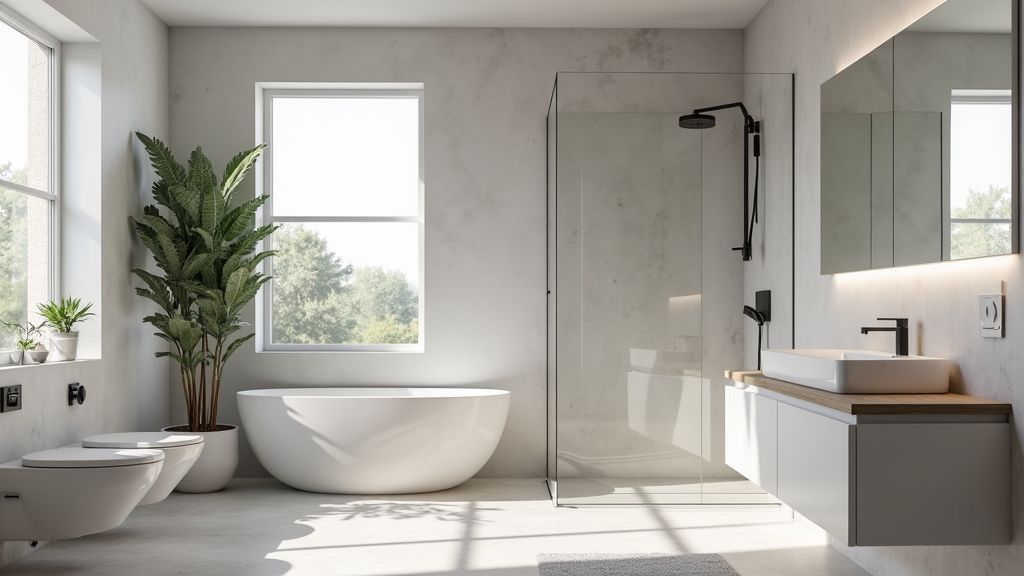In a world where efficiency and style merge, the traditional bathtub is often overshadowed by its modern counterpart—the shower. From boosting your home's aesthetic appeal to accommodating lifestyle changes, this trend is reshaping how we approach bathroom renovations. Discover why more homeowners are embracing this transformation, and learn how you can make it work for your space.

A Shift in Lifestyle: Why Showers Are Taking Over
Modern homeowners are increasingly opting for shower installations as a reflection of their busy lifestyles. As the pace of life quickens, the convenience of a quick rinse outweighs a prolonged soak. Jane Mitchell, a homeowner in Seattle, shares, 'Switching to a shower not only saved me time but provided a fresher start to my day.' These conversions are not just about speed; they are about blending functionality with sophisticated design.
Maximizing Space: The Perfect Solution for Smaller Bathrooms
With urban living on the rise, maximizing space is essential. A bathtub often requires a large footprint, whereas a streamlined shower can create a sense of openness. Richard Lee, an interior designer from New York, explains, 'A well-designed shower can make even the smallest bathroom feel spacious and inviting.' By converting a tub to a shower, you open up the room, allowing for more freedom in fixture and decor choices.
Safety and Accessibility: Catering to All Generations
As more families are accommodating multigenerational living, safety and accessibility become key considerations. Showers offer safer entry and exit points, reducing the risk of slips and falls. Angela Torres, who recently converted her bathtub to a shower for her aging mother, says, 'It's a relief to know that she can bathe independently without the fear of accidents.' Professional installations can also include built-in seats, handrails, and non-slip tiles to enhance safety further.
Aesthetics and Style: Designing Your Dream Shower
Today's showers are not just functional; they are an opportunity to showcase your personal style. From rain showerheads and frameless glass doors to unique tile patterns, the possibilities are endless. Drawing inspiration from spa-like retreats, homeowners can turn their bathrooms into serene sanctuaries. 'The conversion allowed me to be bold with my design choices,' says Lucas Zhang, who incorporated herringbone tiles for a touch of elegance.
The Environmental Perspective: Reducing Water Usage
In an era of sustainability, showers are a more eco-friendly option than bathtubs. On average, a shower uses less water than a bath unless you spend an excessively long time under the spray. Eco-conscious homeowner Grace Patel notes, 'I feel good knowing my shower conversion is a step towards reducing my water footprint.' Modern low-flow showerheads are designed to conserve water without sacrificing pressure, making this choice both environmentally and wallet friendly.
Increase Property Value: A Wise Investment
For those considering resale value, a bathtub-to-shower conversion can be a smart investment. Perceptions of luxury have shifted, and potential buyers often prioritize updated bathrooms with modern amenities. Realtor Mark Jones points out, 'Homes with stylish, accessible showers can attract more buyers and fetch higher prices.' A contemporary shower can transform a standard bathroom into a desirable feature that sets a property apart.
Understanding the Cost: Budget-Friendly to Luxurious Options
The cost of converting a bathtub to a shower can vary significantly based on design choices and materials. While some may choose to splurge on high-end finishes, others can achieve a chic look on a budget with smart planning. DIY enthusiast Carla Simmons shares, 'By choosing cost-effective materials and doing some of the work myself, I managed to keep my renovation under $3,000.' A thorough plan will ensure that your conversion meets both aesthetic preferences and financial constraints.
Key Considerations: Planning Your Conversion
Embarking on a bathtub-to-shower conversion requires careful planning, from plumbing adjustments to choosing the right contractor. A successful project begins with understanding your needs and limitations. Contractor Ben Murphy advises, 'Consult with professionals to assess plumbing requirements and explore design ideas.' With the right team and resources, your conversion journey can be smooth and rewarding, resulting in a bathroom that not only meets your current needs but also adapts to future changes.